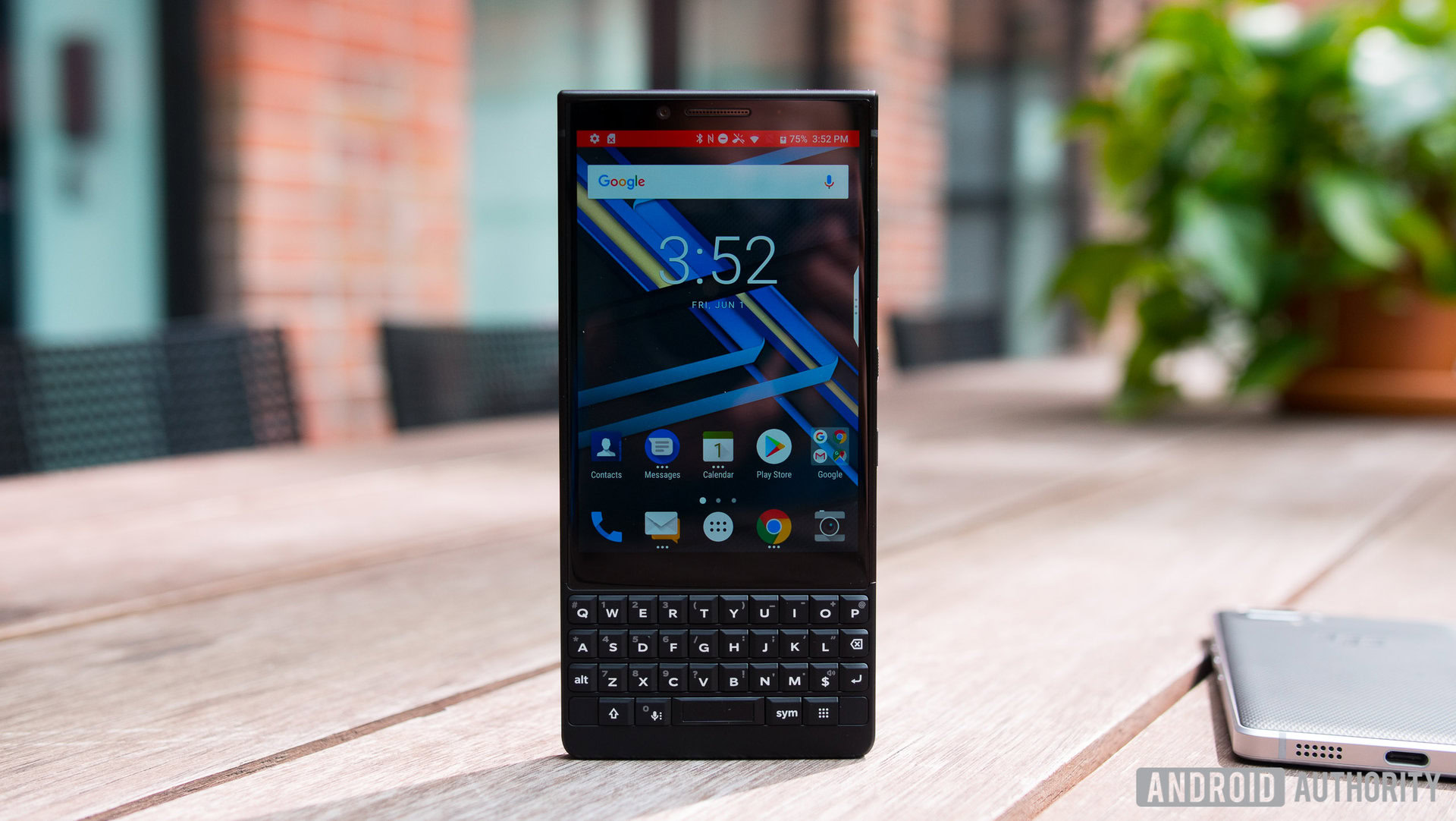Affiliate links on Android Authority may earn us a commission. Learn more.
BlackBerry KEY2 specs: Two-day battery life, two cameras, and twice the power
April 19, 2019
BlackBerry kicked off its renaissance in earnest last year with the keyboard-toting KEYone. Now the Canadian company is back for round two with the BlackBerry KEY2. Let’s take a look at whether the KEY2 packs enough oomph to convince you to whip out your cash.
The full BlackBerry KEY2 specs can be found below:
| BlackBerry KEY2 | |
|---|---|
Display | 4.5-inch IPS LCD 1,620 x 1,080 resolution 434ppi 3:2 aspect ratio Corning Gorilla Glass 3 |
Keyboard | Touch-enabled 35 key backlit physical QWERTY keyboard Integrated fingerprint sensor |
SoC | Qualcomm Snapdragon 660 2.2 + 1.8GHz, 64-bit Kryo 260 octa-core |
GPU | Adreno 512 |
RAM | 6GB |
Storage | 64GB (U.S.) 128GB (Global) microSD expansion up to 256GB |
Cameras | Rear: Main: 12MP sensor with an ƒ/1.8 aperture and 1.28μm pixels, dual phase detect autofocus Second: 12MP sensor with an ƒ/2.6 aperture and 1μm pixels, phase detect auto focus HDR, 4K video recording at 30fps Front: 8MP fixed-focus sensor with an ƒ/2.0 aperture and 1.12μm pixels 1080p video recording at 30fps |
Audio | 3.5mm headphone jack HD audio for improved audio playback Optimized deal microphone placement for active noise cancellation |
Battery | 3,500mAh Qualcomm Quick Charge 3.0 |
IP rating | N/A |
Sensors | GPS/A-GPS Fingerprint Accelerometer Magnetometer Gyroscope Proximity Ambient light |
Network | BBF100-1 — EU, Africa, AU, Japan FDD-LTE 1, 2, 3, 4, 5, 7, 8, 12, 13, 17, 19, 20, 26, 28, 32 TD-LTE 38, 39, 40, 41 BBF100-2 — Canada, US, LATAM FDD-LTE 1, 2, 3, 4, 5, 7, 8, 12, 13, 14, 17, 20, 28, 29, 30, 66 TD-LTE 38, 39, 40, 41 BBF100-4 — China FDD-LTE 1, 2, 3, 4, 5, 7, 8, 12, 13, 17, 20, 26, 28 TD-LTE 34, 38, 39, 40, 41 CDMA: BC0 BBF100-6 (Dual-SIM version) — ME, APAC, India, Indo FDD-LTE 1, 2, 3, 4, 5, 7, 8, 12, 13, 17, 19, 20, 26, 28, 32 TD-LTE 38, 39, 40, 41 All variants: HSPA+ 1,2,4,5/6,8 Quad Band GSM/GPRS/Edge |
Connectivity | 802.11 b/g/n for 2.4GHz, 802.11 a/n and a/c for 5GHz 4G mobile hotspot, Wi-Fi direct Bluetooth 5.0 LE USB Type-C (USB 3.0) USB OTG, NFC, FM radio, support DP through Type-C port |
Software | Android 8.1 Oreo |
Dimensions | 151.4 x 71.8 x 8.5mm |
Colors | black, silver |
BlackBerry KEY2 specs walkthrough
Starting with the outside, the KEY2 features a 4.5-inch display with 3:2 aspect ratio and 1,620 x 1,080 resolution. The display size might make some folks feel a bit claustrophobic, but the extra width makes it feel much less cramped than if the phone had a 16:9 display.
The KEY2 doubles up its camera options, featuring a pair of 12MP sensors around back. It uses both sensors for portrait mode, and the second lens also has a telephoto lens for zooming. Plenty of other smartphones feature similar camera setups, but at least BlackBerry is now keeping up.
The KEY2 sports a Snapdragon 660 chipset and a generous 6GB of RAM. By comparison, the KEYone featured the Snapdragon 625 and 3GB of RAM.
Not only does the Snapdragon 660 support faster RAM and an improved image signal processor (ISP), but the chipset’s eight Kryo 260 CPUs should deliver up to 50 percent better performance than the Snapdragon 625. Combined with the additional RAM, that speed increase should fix the slightly sluggish performance we encountered with the KEYone, while retaining similar battery life.

The KEY2 features a 3,500mAh battery, which BlackBerry promises will give you two days of use. Weirdly, BlackBerry restricted the KEY2 to Quick Charge 3.0, even though the Snapdragon 660 supports the newer Quick Charge 4.0 standard.
Less weird is the headphone jack, which BlackBerry said it will not remove anytime soon, and the 64GB of expandable storage. Other regions will have versions with up to 128GB of storage and dual SIM functionality, so those of us in the U.S. miss out a little bit.
Unfortunately, the KEY2 does not feature any IP rating. The OnePlus 6 and Moto Z3 Play are in the same price bracket and also lack IP ratings, but they feature some level of waterproofing. Here is hoping the same will be true about the KEY2. The phone runs Android 8.1 Oreo out of the box, but you’ll be able to upgrade it to the latest Android 9.0 Pie.
Last but certainly not least is the KEY2’s keyboard. Not only does the phone feature larger keys than the KEYone, but they now feature a matte finish that should feel nicer, too.
All in all, the KEY2 checks off enough boxes for a 2018 mid-range smartphone. What are your thoughts on the BlackBerry KEY2 specs? Be sure to check out our related KEY2 content below.
Related
Thank you for being part of our community. Read our Comment Policy before posting.